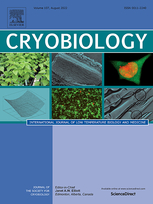
L'adaptation de tissus de cartilage congelés sans cryoprotection pour la conservation génétique.
The value of frozen cartilage tissues without cryoprotection for genetic conservation.
Auteurs : CETINKAYA G., HATIPOGLU I., ARAT S.
Type d'article : Article
Résumé
Animal tissues frozen without cryoprotection are thought to be inappropriate for use as a donor for somatic cell nuclear transfer (SCNT) studies. Cells in tissues that have been frozen without a cryoprotectant are commonly thought to be dead or to have lost genomic integrity. However, in this study we show that the frozen auricular cartilage tissues of anatolian buffalo contain a considerable number of viable healthy cells. The cells in auricular cartilage tissues are resistant to cryo-injury at -80 °C. Primary cell cultures were established from defrosted ear tissues which were frozen without cryoprotectant. The growth and functional characteristics of primary cell cultures are characterized according to cell growth curve, cell cycle analysis, karyotype and GAG synthesis. The results indicate that frozen cartilage tissues could be valuable materials for the conservation of species and SCNT technology.
Détails
- Titre original : The value of frozen cartilage tissues without cryoprotection for genetic conservation.
- Identifiant de la fiche : 30010864
- Langues : Anglais
- Source : Cryobiology - vol. 68 - n. 1
- Date d'édition : 02/2014
- DOI : http://dx.doi.org/10.1016/j.cryobiol.2013.11.008
Liens
Voir d'autres articles du même numéro (9)
Voir la source
Indexation
- Thèmes : Influence du froid sur les cellules, tissus et organes
- Mots-clés : Génétique; Cartilage; Tissu; Cryoconservation
-
Cryobiology of articular cartilage: ice morphol...
- Auteurs : MULDREW K., NOVAK K., YANG H., et al.
- Date : 03/2000
- Langues : Anglais
- Source : Cryobiology - vol. 40 - n. 2
Voir la fiche
-
Assessment of molecular genetic stability betwe...
- Auteurs : MAKI S., HIRAI Y., NIINO T., et al.
- Date : 09/2015
- Langues : Anglais
- Source : CryoLetters - vol. 36 - n. 5
Voir la fiche
-
A simple cryopreservation method for the mainte...
- Auteurs : OEGEMA T. R. Jr, DELORIA L. B., FEDEWA M. M., et al.
- Date : 06/2000
- Langues : Anglais
- Source : Cryobiology - vol. 40 - n. 4
Voir la fiche
-
Effect of cryopreservation on human articular c...
- Auteurs : RENDAL-VÁZQUEZ M. E., MANEIRO-PAMPÍN E., RODRÍGUEZ-CABARCOS M., et al.
- Date : 02/2001
- Langues : Anglais
- Source : Cryobiology - vol. 42 - n. 1
Voir la fiche
-
Cryopreservation of articular cartilage.
- Auteurs : ABAZARI A., JOMHA N. M., ELLIOTT J. A. W., et al.
- Date : 06/2013
- Langues : Anglais
- Source : Cryobiology - vol. 66 - n. 3
Voir la fiche
